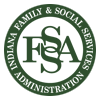Last month, FSSA presented the Medicaid Forecast to the State Budget Committee as we do every December. A substantial variance in actual and projected Medicaid spend was presented and FSSA committed to bringing forward a series of sustainability strategies to mitigate the impact of the forecasted need for an increased appropriation to the Medicaid program.
Since then, FSSA has been diligently reviewing data, policies, and federally approved program authorities to identify the key drivers behind the variance. We sought to understand the issues so solutions can be as tailored as possible and maintain our focus on the people served and supported by FSSA. Our solutions are detailed below in two categories: Â strategies related to the Aged & Disabled (A&D) waiver and strategies across the Medicaid program. A&D waiver strategies are important because data showed this is where the Medicaid program is most acutely seeing an unanticipated growth in spending.
Implementation of some of these strategies necessitates changes to our draft waivers recently out for public comment. As a result, a second round of public comment begins today, Jan. 17, for the A&D, PathWays, Traumatic Brain Injury (TBI), Community Integration and Habilitation (CIH), and Health & Wellness (H&W) waivers. The Indiana PathWays for Aging program is still on track to launch this summer.
In addition to these strategies, FSSA will be implementing enhancements to the forecast process and Medicaid budget monitoring. These include a detailed review of assumptions, reducing data lag, and identifying emerging risks. Across divisions, improved policies and controls will ensure a comprehensive understanding of programmatic changes’ financial impacts before implementation. We will also increase monitoring of enrollment, utilization, and expenditures, enhancing our ability to respond promptly to trends. More information on these efforts will be available in the near future.
FSSA’s Medicaid forecast mitigation strategies are outlined below. More details about each will be forthcoming as a number of these strategies will be implemented in the coming weeks. As we move forward, FSSA remains committed to clear communication with members, their families, care managers, providers, and all interested stakeholders.
Aged & Disabled Waiver Strategies
Legally Responsible Individuals (LRIs), Attendant Care Compliance, and Structured Family Caregiving (Implementation target: 30 days from now):
- Â Effective immediately, no new Legally Responsible Individuals (LRIs), including parents of minor children, legal guardians, and spouses, may provide attendant care services. LRIs are also not permitted to provide the Home and Community Assistance (HCA) service. This will ensure compliance with the current CMS-approved A&D waiver.
- FSSA will work with providers and families currently utilizing LRI-provided attendant care to transition to an alternative attendant care provider or to determine a transition plan to the service of structured family caregiving on or before July 1, 2024.
- FSSA will implement changes to billing processes and require providers employing LRIs for waiver services to include this information on the claim submitted for payment.
Service Plan Review and Approvals (Implementation target: Mid-February 2024):
- FSSA will adjust the threshold for A&D waiver service plans that are automatically approved.
- FSSA will increase State staff engagement to ensure a person-centered, thoughtful, and thorough review process for initial and annual service plans, as well as for specific services like home modification.
Service Definition Compliance (Implementation target: Mid to end of February 2024):
- Â FSSA will reinforce practices to align all services with federally approved definitions.
- FSSA will train care managers and providers on home and community assistance requirements.
- FSSA will further clarify Home and Community Assistance (HCA) and Attendant Care (ATTC) service definitions in a waiver amendment planned for 2025.
Pediatric Eligibility Review & InterRAI Tool (Implementation target: July 2024):
- FSSA will ensure level of care (LOC) assessments for applicants aged 0-22 on the A&D waiver are accurate and appropriate for pediatric populations.
- FSSA will develop training for AAAs conducting pediatric LOC assessments.
- FSSA will create a dedicated team to review pediatric assessments.
- FSSA will reinforce the expectation of in-person assessments, regardless of age.
- FSSA will plan for a new strategy or approach to assessing youth on HCBS waivers longer-term with a proposed new method or tool in July of 2025.
End Retroactive Coverage while Medicaid Eligibility is Pending (Implementation target: TBD):
- FSSA will implement system changes to restrict retroactive waiver coverage in compliance with current waiver authority.
- FSSA will review existing service plans to align with confirmed Medicaid eligibility status.
Waiver Slots (Implementation target: Currently in effect and July 2024):
- Â FSSA will maintain current A&D Waiver slots at approximately 50,000 and expanding SFY 2025 waiver slots to 55,000.
- FSSA will evaluate potential waitlist scenarios to stay within approved participant count.
Continuity of Care – 180 days to 90 days (Implementation Target: PathWays launch):
- FSSA will adjust continuity of care requirements in the transition into the PathWays program for existing service plans from 180 days to 90 days.
Strategies Applying to All Medicaid Services: 2% Rate Indexing (Implementation Target: Currently in effect)
- FSSA will temporarily pause the 2% rate indexing across Medicaid servicesÂ
The impacted waivers have been posted to FSSA’s website for public comment. The PathWays waiver draft can be found here and the FSW, CIH, TBI, and H&W waiver drafts can be found here. Instructions for how to submit a public comment on the waiver drafts can also be found at these links.
Please contact medicaid@fssa.in.gov with any questions. Ongoing stakeholder collaboration and feedback are invaluable as we work together to implement these strategies effectively.





